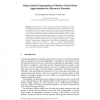Free Online Productivity Tools
i2Speak
i2Symbol
i2OCR
iTex2Img
iWeb2Print
iWeb2Shot
i2Type
iPdf2Split
iPdf2Merge
i2Bopomofo
i2Arabic
i2Style
i2Image
i2PDF
iLatex2Rtf
Sci2ools
125
click to vote
GECCO
2004
Springer
2004
Springer
Using Genetic Programming to Obtain a Closed-Form Approximation to a Recursive Function
Abstract. We demonstrate a fully automated method for obtaining a closedform approximation of a recursive function. This method resulted from a realworld problem in which we had a detector that monitors a time series and where we needed an indication of the total number of false positives expected over a fixed amount of time. The problem, because of the constraints on the available measurements on the detector, was formulated as a recursion, and conventional methods for solving the recursion failed to yield a closed form or a closed-form approximation. We demonstrate the use of genetic programming to rapidly obtain a high-accuracy approximation with minimal assumptions about the expected solution and without a need to specify problem-specific parameterizations. We analyze both the solution and the evolutionary process. This novel application shows a promising way of using genetic programming to solve recurrences in practical settings.
Related Content
| Added | 01 Jul 2010 |
| Updated | 01 Jul 2010 |
| Type | Conference |
| Year | 2004 |
| Where | GECCO |
| Authors | Evan Kirshenbaum, Henri Jacques Suermondt |
Comments (0)

